When it comes to achieving glowing, clear skin, many people turn to topical treatments. But what if the secret to healthier skin is deep within your gut? In this article, we'll explore the role of fiber and gut health, the gut-skin axis, and how fiber-rich foods can help reduce skin issues like acne, eczema, and inflammation. Plus, discuss the benefits of fiber in the diet.
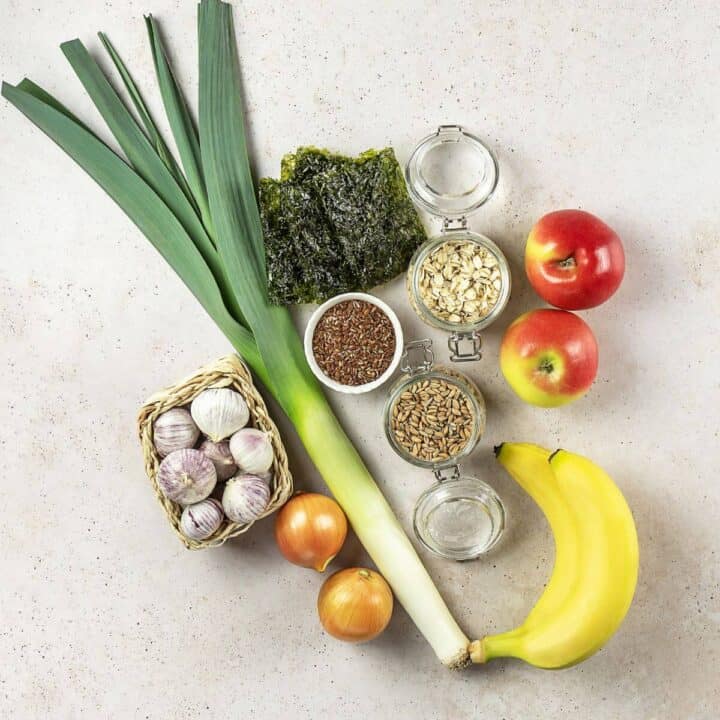
Table of Contents
As a holistic gut health nutritionist, I often highlight the powerful connection between what we eat, particularly fiber, and how it impacts our gut health, which in turn influences our skin.
❗️ The Importance of Fiber For Gut Health
When you think of fiber, you may associate it with digestive regularity and supporting a healthy gut.
But its benefits go beyond just digestion. That is simply one benefit of adding more into your diet. Fiber plays a crucial role in maintaining gut health, which directly influences your skin.
Fiber-rich foods help fuel the gut microbiome, the trillions of beneficial bacteria that reside in your digestive tract.
These bacteria thrive on dietary fiber, and in return, they produce short-chain fatty acids (SCFAs), which have numerous health benefits for both your gut and skin.
What Is Fiber?
Fiber is the "skeleton" of plants, found only in plant foods. It's a type of carb your body can't digest, crucial for digestive health, weight maintenance, and reducing the risk of diabetes, heart disease, and some cancers.
Types of Fiber and How They Work
There are two main types of fiber: soluble and insoluble.
Both types are essential for gut health and, by extension, for maintaining healthy skin.
- Soluble Fiber - Dissolves in water and forms a gel-like substance in your gut. It helps slow digestion, allowing better absorption of nutrients. This type of fiber is found in foods like oats, apples, beans, and chia seeds.
- Insoluble Fiber - Doesn't dissolve in water. It adds bulk to the stool and helps food pass through the digestive system more quickly, preventing constipation and promoting regular bowel movements. Foods high in insoluble fiber include whole grains, nuts, and leafy vegetables.
The combination of both types of fiber is essential for keeping your digestive system running smoothly, maintaining a healthy balance of gut bacteria, and reducing inflammation - all of which can have a positive effect on your skin.
How Much Do You Need?
According to the Academy of Nutrition and Dietetics women should aim for 25 grams per day while men should aim for 38 grams per day.
🔑 Key Importance of Fiber
- Fiber supports digestion to keep things moving smoothly.
- It stabilizes blood sugar helping to prevent spikes and crashes.
- It promotes fullness helping you feel satisfied longer.
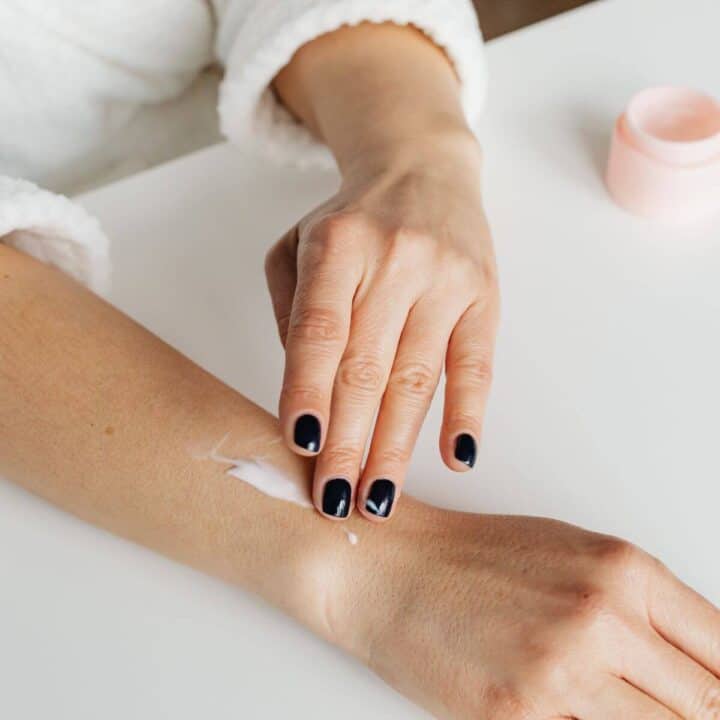
🧡 The Gut-Skin Axis: How Your Gut Affects Your Skin
The relationship between your gut and skin, often referred to as the "gut-skin axis," is more intertwined than many realize.
Inflammation in the gut, caused by an imbalanced gut microbiome, food sensitivities, or poor digestion, can lead to inflammatory skin conditions like acne, rosacea, and eczema.
A compromised gut lining can also allow toxins and harmful bacteria to enter the bloodstream, triggering systemic inflammation and manifesting as skin issues.
Key Benefits of Fiber and Gut Health
Here's how fiber plays a key role in improving the gut-skin connection.
1. Reducing Inflammation
Fiber, especially soluble fiber, feeds beneficial bacteria in the gut, which in turn produce SCFAs.
These SCFAs, particularly butyrate, have anti-inflammatory properties and help regulate immune responses.
When gut inflammation is reduced, it leads to a reduction in systemic inflammation, which can alleviate skin conditions like acne, eczema, and psoriasis.
2. Supporting Detoxification
A healthy gut helps detoxify your body by eliminating waste, toxins, and excess hormones through regular bowel movements.
Insoluble fiber helps promote this process by ensuring that waste is efficiently removed from the body.
Without proper detoxification, these toxins may recirculate in the body, potentially contributing to skin breakouts and dull complexion.
3. Balancing Gut Bacteria
Imbalances in the gut microbiome, known as dysbiosis, are linked to various skin problems. Fiber helps promote the growth of beneficial bacteria, which can outcompete harmful bacteria.
A healthy, balanced gut microbiome is crucial for clear, healthy skin. Beneficial bacteria also aid in the absorption of nutrients like zinc and omega-3 fatty acids, which are vital for skin health.
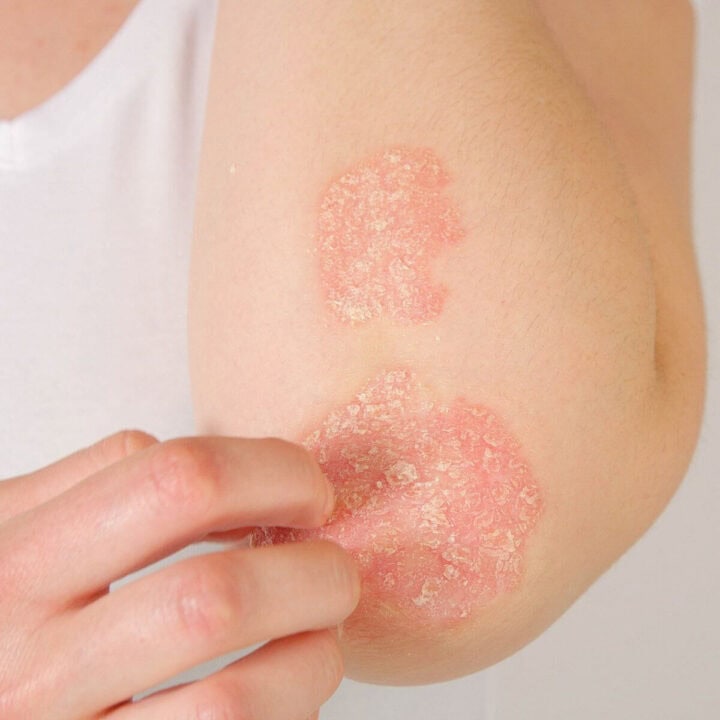
💚 Fiber, Gut Health, and Skin Conditions
Let's take a closer look at how increasing your fiber intake can specifically help with common skin issues.
1. Fiber and Acne
Acne is often linked to inflammation and hormonal imbalances, both of which can be influenced by gut health.
A fiber-rich diet helps regulate hormones by supporting the detoxification of excess estrogen through regular bowel movements.
Additionally, by feeding beneficial gut bacteria, fiber reduces gut inflammation, which can help reduce inflammatory acne.
2. Fiber and Eczema
Eczema is an inflammatory skin condition that can be exacerbated by gut dysbiosis and food sensitivities.
Soluble fiber, by nourishing gut bacteria, helps strengthen the gut barrier and reduces inflammation, potentially easing the symptoms of eczema.
Probiotic-rich foods combined with fiber can also enhance this effect by balancing gut bacteria.
3. Fiber and Psoriasis
Psoriasis is an autoimmune skin condition that can be linked to chronic inflammation and leaky gut syndrome.
A diet rich in fiber supports the integrity of the gut lining, preventing the leak of inflammatory compounds into the bloodstream.
By reducing gut permeability, fiber can play a role in managing psoriasis flare-ups.
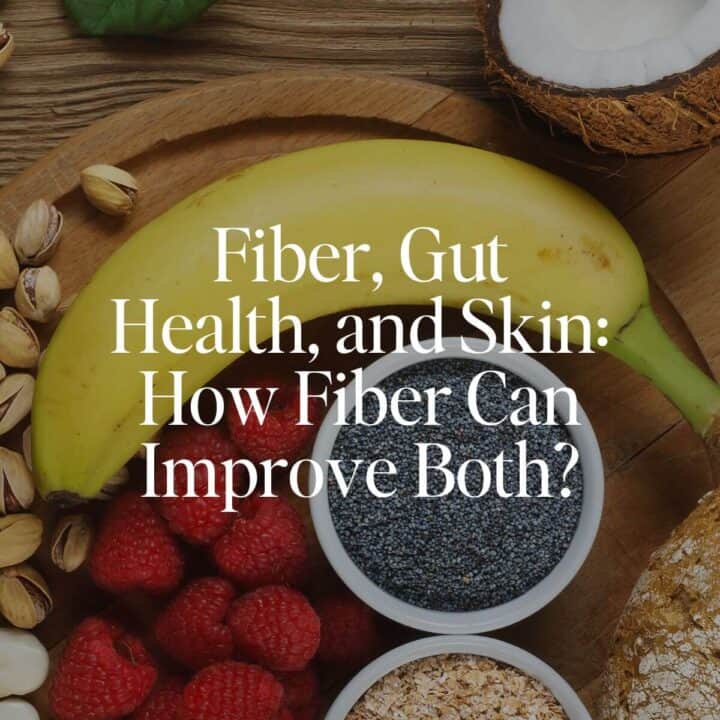
🌟 Best Fiber-Rich Foods for Gut and Skin Health
If you're looking to improve your skin through your diet, adding certain foods is key.
Here are some of the best sources of fiber that benefit both gut health and skin. My best foods to help benefit your skin.
📥 GET THIS RECIPE IN YOUR INBOX 📥
1. Chia Seeds
Chia seeds are an excellent source of soluble fiber and omega-3 fatty acids. They support healthy digestion and reduce inflammation, both in the gut and on the skin.
Add chia seeds to your smoothies, yogurt, or oatmeal for a fiber boost.
2. Oats
Oats are rich in both kinds, making them a great option for promoting gut regularity and reducing inflammation.
They also contain beta-glucan, which helps moisturize the skin and promote skin healing.
3. Sweet Potatoes
Sweet potatoes are high in both fiber and beta-carotene, an antioxidant that helps protect the skin from oxidative stress.
Their anti-inflammatory properties can help calm acne-prone skin.
4. Berries
Berries like raspberries, blueberries, and blackberries are packed with antioxidants and soluble fiber.
These fruits can help reduce inflammation in the gut and improve skin elasticity, giving your skin a healthy glow.
5. Leafy Greens
Leafy greens like kale, spinach, and collard greens are rich in fiber, vitamins, and antioxidants.
They help maintain a healthy gut and fight inflammation, making them a great addition to any skin-friendly diet.
6. Flaxseeds
Flaxseeds are another excellent source of soluble fiber and omega-3 fatty acids, which help reduce inflammation in both the gut and skin.
They can also support hormone balance, which is important for managing acne and other hormonal skin issues.

💦 Fiber and Hydration: A Skin and Gut Duo
It works best when paired with adequate hydration. Since fiber absorbs water, drinking enough fluids is essential for proper digestion and preventing constipation.
Dehydration can slow down the digestive process and hinder its ability to flush out toxins, leading to gut inflammation and skin flare-ups.
Make sure to drink plenty of water throughout the day to support both your gut and skin health.
How to Incorporate More Fiber Into Your Diet?
Now that we know the benefits of adding more fiber into your daily diet, let's learn how to include more into our meals.
Adding more fiber to your diet doesn't have to be complicated.
Foods To Prioritize
- Fruit
- Vegetables
- Whole Grains
- Seeds
- Pulses
Here are some simple tips to increase your daily fiber intake for better gut and skin health.
- Start Your Day With Fiber - Enjoy a fiber-packed breakfast with options like oatmeal, chia seed pudding, or a green smoothie.
- Add Veggies To Every Meal - Aim to fill half your plate with fiber-rich vegetables like broccoli, spinach, carrots, and sweet potatoes.
- Snack Smart - Choose high-fiber snacks like apples with almond butter, carrot sticks, or a handful of nuts.
- Swap Refined Grains For Whole Grains: Opt for whole grain gluten-free bread, brown rice, and quinoa instead of refined grains to boost your intake.
- Include Legumes and Beans: Add lentils, chickpeas, and black beans to salads, soups, and stews for a fiber-rich meal.
⭐️ Pro Nutrition Tip: Increase Fiber Intake
Start your day with a fiber-packed breakfast that keeps you energized and satisfied.
For example, blend a smoothie with fiber-rich fruits like berries or apples, a handful of leafy greens, and a tablespoon of chia or flax seeds.
Enjoy this nutritious start to power through your day!
🥘 Meal Prep Tips
One of the best ways to set yourself up for success is by prepping meals in advance. Instead of overwhelming yourself by prepping an entire week's worth of food, start small.
Prepare just one fiber-rich meal at a time!
Focus on gut-friendly, nutrient-dense options like:
- Overnight Oats - A delicious mix of oats, chia seeds, and your favorite fruits.
- Hearty Soups - Packed with beans and vegetables that are high in both soluble and insoluble fiber.
- Fiber-Rich Salads - Combine leafy greens with nuts, whole grains, and vibrant veggies for a satisfying crunch.
Be sure to check out some simple ways to add more fiber into your meals by visiting:
This approach not only makes meal planning manageable but also ensures you're consistently nourishing your gut.
🤔 FAQs on Fiber, Gut Health, and Skin
Q: How much fiber should I eat daily for better skin?
A: The recommended daily intake of fiber is around 25-35 grams for adults. However, individual needs may vary based on your gut health and specific skin concerns. Gradually increase your intake and listen to your body.
Q: Can Too Much fiber cause skin problems?
A: Consuming excessive amounts of fiber, especially without adequate hydration, can lead to digestive issues like bloating and gas.
This could potentially exacerbate gut inflammation, which could negatively affect the skin. Moderation is key.
Q: How long does it take to see improvements in my skin after increasing fiber intake?
A: Results vary depending on individual gut health, but you may notice improvements in digestion and skin within a few weeks of consistently increasing fiber intake.
However, lasting results may take several months as your gut microbiome rebalances.
The Benefits of Fiber in the Diet Impact Skin and Gut Health
The connection between gut health and skin health is undeniable, and the health benefits by including it in the diet play a pivotal role in maintaining both.
By nourishing your gut microbiome, reducing inflammation, and supporting detoxification, it can help resolve skin issues from the inside out.
Incorporating more fiber-rich foods into your diet is a simple, yet powerful way to improve your gut health and achieve radiant, clear skin.
If you're struggling with gut issues, skin problems, or both, consider working with a holistic gut health nutritionist and begin a nutrition program.
Let's Discuss How to Increase Fiber Intake For Better Gut Health and Digestion
So, have were you surprised by any of the health benefits that fiber can have on our gut and skin health? Let me know your personal experience below?
You can also connect with me @EatYourNutrition on Instagram. I love seeing your photos. #EatYourNutrition #LauraVillanueva
Additional Resources
Also, consider exploring the following resources for further reading and guidance on clear skin solutions and better gut health.
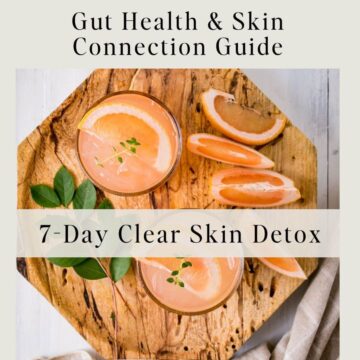
Many people don't understand the importance of a healthy diet. This guide is your new start to clear skin and an acne free life. Download this guide today.
- Meal Plan - If you need more help with a clear skin solution to your nutrition and health, then you might want a simple recipe guide and anti-inflammatory diet meal plan packed with the key to help ditch inflammation and reset the body. So, if you have chronic inflammation issues, try this acne skin nutritionist meal plan and recipes inside the Anti-Inflammatory Diet Meal Plan and Recipe Guide.
- Need Extra Support - Join my Balanced Hormones - Clear Radiant Skin Program. Register here to join the program from a gut and skin health holistic nutritionist.
- Group Support - Join my Featured Nutrition Challenge. All seasonal nutrition challenges come with a meal plan, recipe guide, grocery shopping list, and a seasonal featured nutrition theme.














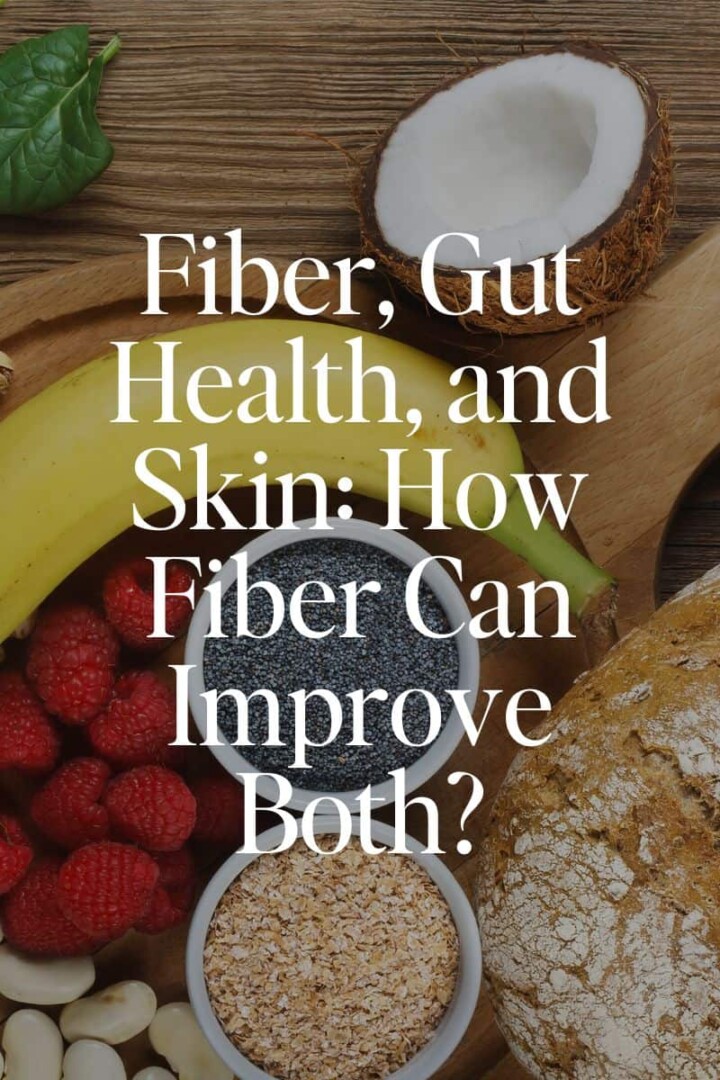
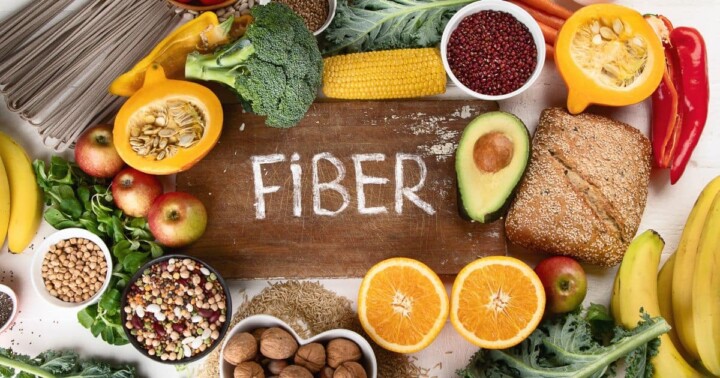

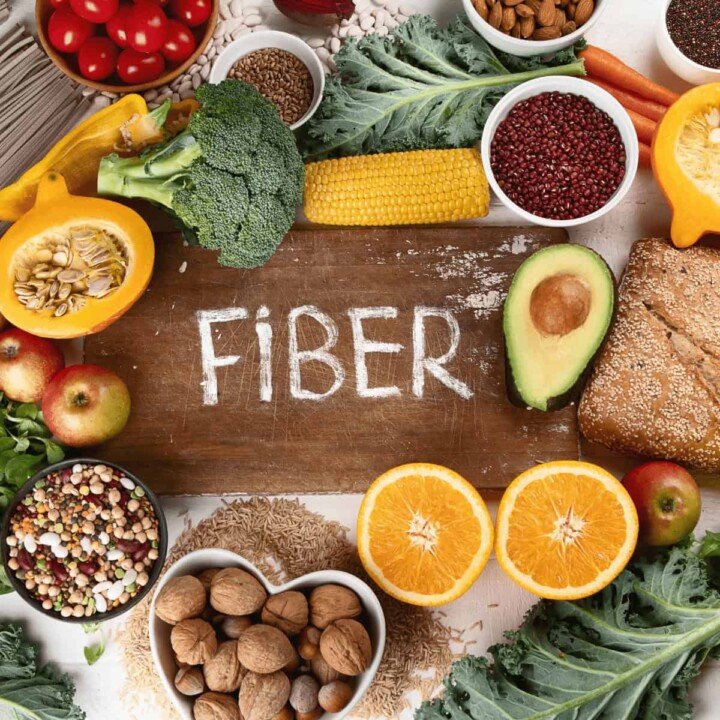


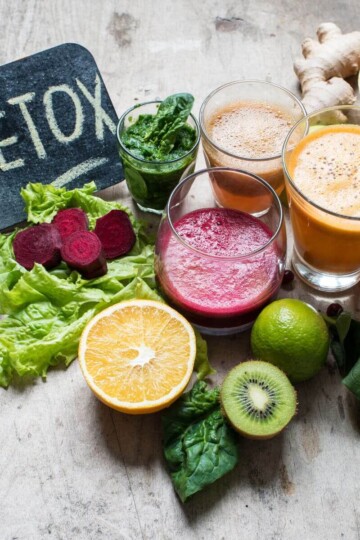

Comments
No Comments